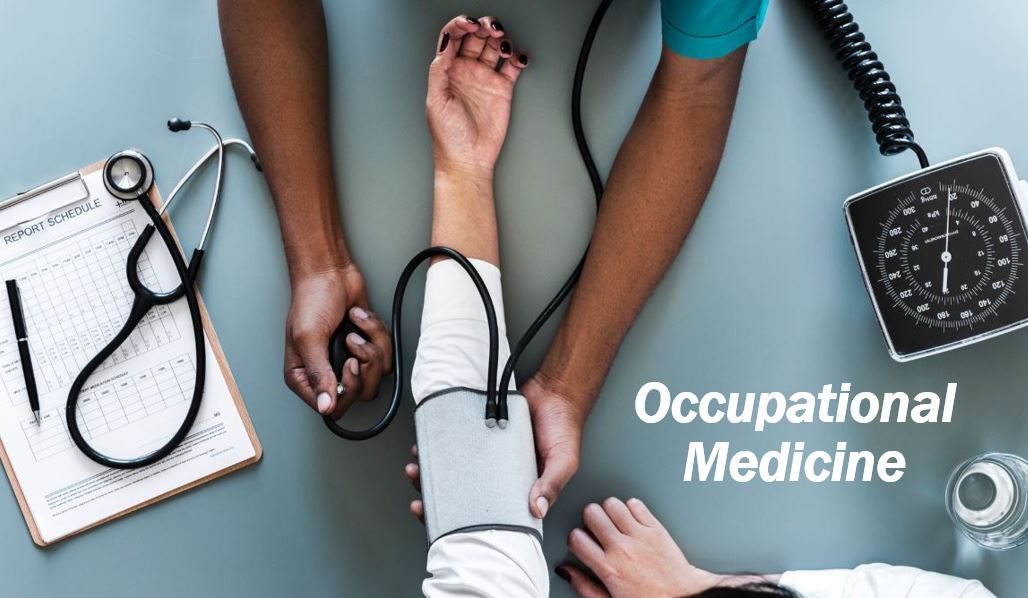What is occupational medicine? Definition and examples

Occupational medicine is concerned with maintaining the health of employees in the workplace. It includes the treatment of injuries and diseases and also their prevention.
A secondary objective of occupational medicine is to boost or maintain productivity.
Occupational physicians diagnose, manage, and prevent injuries and diseases that have been caused or exacerbated by factors in the workplace. They focus on every aspect of the effects of work on health and also health on work.
Occupational medicine – nature of the job
Occupational physicians visit people’s places of work and assess a wide range of work-related health matters.
Part of their work includes helping employees to stay in their jobs or return to work. In most cases, the employee has had an accident or illness.
Occupational physicians work in their country’s health services and large organizations. They may work in, for example, the armed forces, transport organizations, and the emergency services.
Many manufacturers have their own in-house occupational health services.

Occupational Safety and Health
Occupational medicine, which we once called industrial medicine, is a branch of occupational safety and health (OSH). OSH is concerned with the safety, health, and welfare of people in the workplace.
OSH also includes the wellbeing of employers, customers, suppliers, and anybody else who the workplace may affect.
We also call it occupational health and safety (OHS), occupational health, or workplace health and safety (WHS).
Occupational medicine – common issues
Occupational physicians typically have to deal with the following issues:
- Asbestos-related diseases.
- Work-related stress.
- Hearing loss caused by noise.
- Back pain.
- Problems that exposure to chemicals and vibration may cause.
According to the UK’s National Health Service:
“Occupational physicians also need to combine their clinical knowledge with a detailed understanding of employment and anti-discrimination legislation as well as environmental and health and safety law.”
“As the importance of employment to health and wellbeing become more widely understood, occupational medicine is moving up the political agenda and is likely to play a larger role in future government policy.
“Teaching medical students and trainees will usually be part of the work if you are employed in a teaching hospital or academic centre.”
Compound word/phrases with ‘Medicine’
The term ‘Occupational Medicine’ is a compound phrase of the words ‘Medicine’ and ‘Occupational.’ From the word ‘Medicine,’ we can make dozens of compound phrases and compound words. Here are twenty of them:
-
Sports Medicine
A branch of medicine that deals with physical fitness, treatment, and prevention of injuries related to sports and exercise.
-
Internal Medicine
A medical specialty dealing with the prevention, diagnosis, and treatment of internal diseases.
-
Preventive Medicine
Medical practices that are designed to avert and avoid disease.
-
Nuclear Medicine
A medical specialty involving the application of radioactive substances in the diagnosis and treatment of disease.
-
Regenerative Medicine
A branch of medicine that develops methods to regrow, repair or replace damaged or diseased cells, organs or tissues.
-
Travel Medicine
A medical field that concentrates on the health of travelers, particularly those traveling to foreign countries.
-
Tropical Medicine
A branch of medicine that deals with health issues that occur uniquely, are more widespread, or prove more difficult to control in tropical and subtropical regions.
-
Personalized Medicine
Medical care designed to optimize efficiency or therapeutic benefit for particular groups of patients, especially by using genetic or molecular profiling.
-
Veterinary Medicine
The branch of medicine that deals with the prevention, diagnosis, and treatment of disease, disorder, and injury in animals.
-
Emergency Medicine
The medical specialty dedicated to the diagnosis and treatment of unforeseen illness or injury.
-
Alternative Medicine
A range of medical therapies that are not regarded as orthodox by the medical profession, such as herbalism and acupuncture.
-
Holistic Medicine
A form of healing that considers the whole person — body, mind, spirit, and emotions — in the quest for optimal health and wellness.
-
Family Medicine
A medical specialty devoted to comprehensive health care for people of all ages.
-
Precision Medicine
An approach to patient care that allows doctors to select treatments that are most likely to help patients based on a genetic understanding of their disease.
-
Space Medicine
The practice of medicine on astronauts in outer space where human bodies can behave quite differently than on Earth.
-
Forensic Medicine
The application of medical knowledge to establish facts in civil or criminal legal cases, such as cause of death or injury.
-
Naturopathic Medicine
A system of treatment that focuses on natural remedies and the body’s vital ability to heal and maintain itself.
-
Occupational Medicine
A specialty focusing on the delivery of health advice to organizations and individuals to ensure that the highest standards of health and safety at work can be achieved and maintained.
-
Environmental Medicine
The branch of medicine concerned with the interaction between individuals and their environments, which can affect health.
-
Community Medicine
A branch of medicine that is concerned with the health of the members of a community, municipality, or region.
Other languages
Here is the term ‘Occupational Medicine’ in various languages:
- Arbeidsgeneeskunde, Bedrijfsgeneeskunde (Dutch)
- Arbeitsmedizin (German)
- Arbetsmedicin (Swedish)
- İş Tıbbı (Turkish)
- Kedokteran Okupasi (Indonesian)
- Médecine du travail (French)
- Medicina del Lavoro (Italian)
- Medicina del Trabajo, Medicina Ocupacional (Spanish)
- Medicina do Trabalho (Portuguese)
- Medisinang Panghanapbuhay (Tagalog)
- Y nghề nghiệp Y học (Vietnamese)
- Медицина праці (Ukrainian)
- профессиональная медицина (Russian)
- الطب المهني (Arabic)
- پزشکی حرفهای (Farsi)
- محنتی طب (Urdu)
- व्यावसायिक चिकित्सा (Hindi)
- व्यावसायिक चिकित्सा (Marathi)
- অকুপেশনাল মেডিসিন (Bengali)
- தொழில் மருத்துவம் (Tamil)
- వృత్తి వైద్యం (Telugu)
- 직업 의학 (Korean)
- 職業医学 (Japanese)
- 职业医学 (Mandarin Chinese)
- 職業醫學 (Cantonese Chinese)
N.B. Some terms may not be direct equivalents.
Video – What is Occupational Medicine
This video, from Marketing Business Network, our sister channel in YouTube, explains what Occupational Medicine is using simple and easy-to-understand terms and examples.

